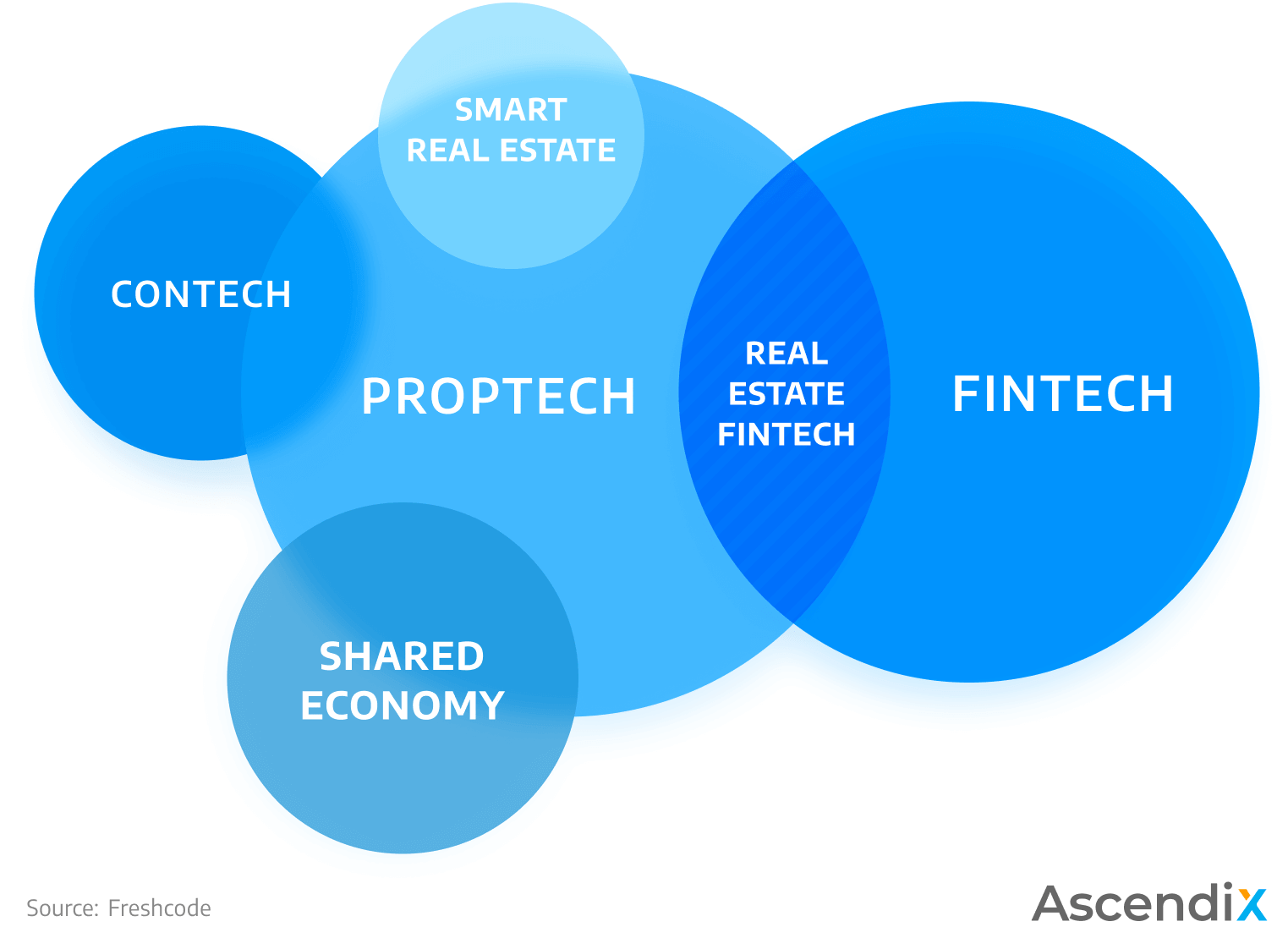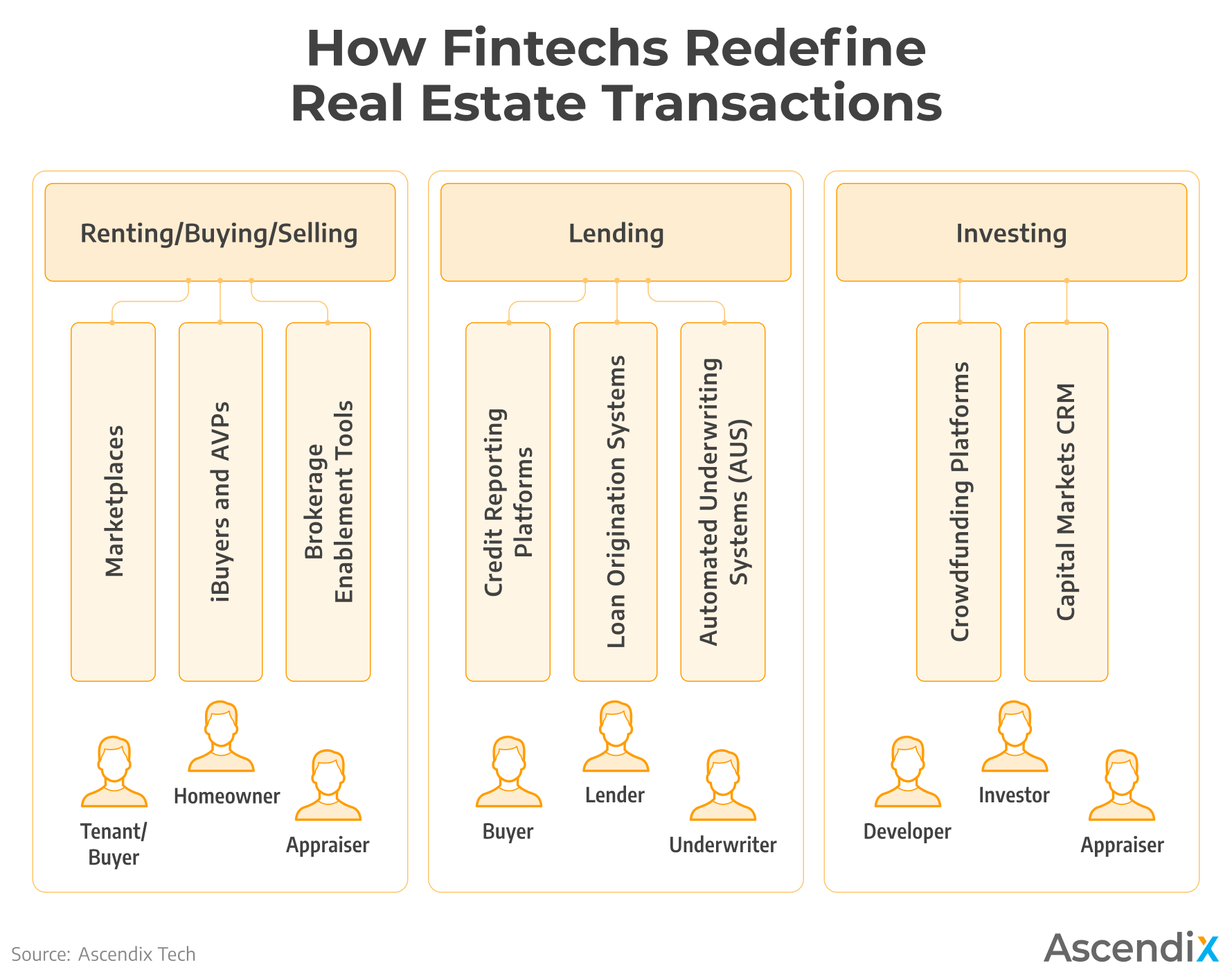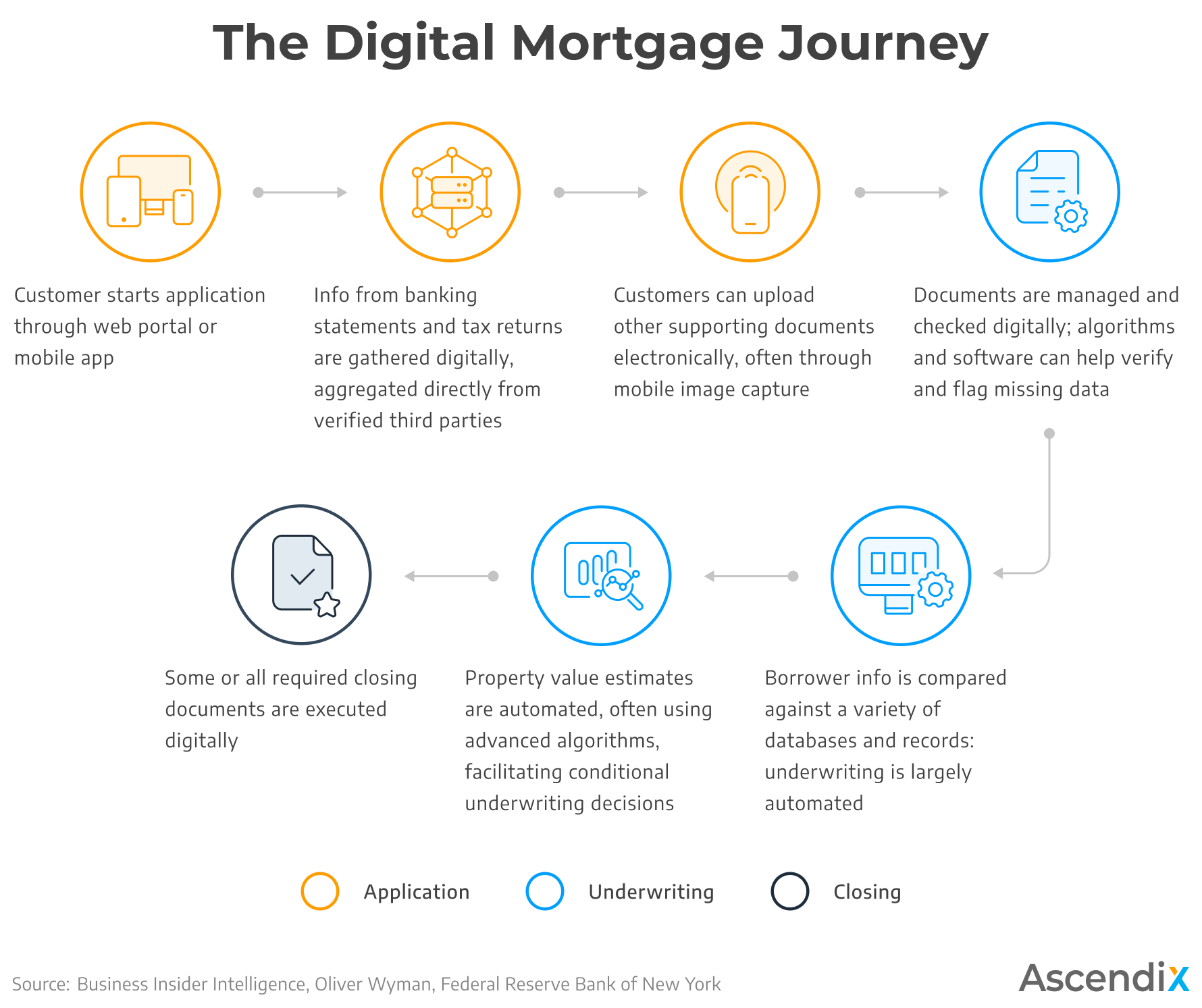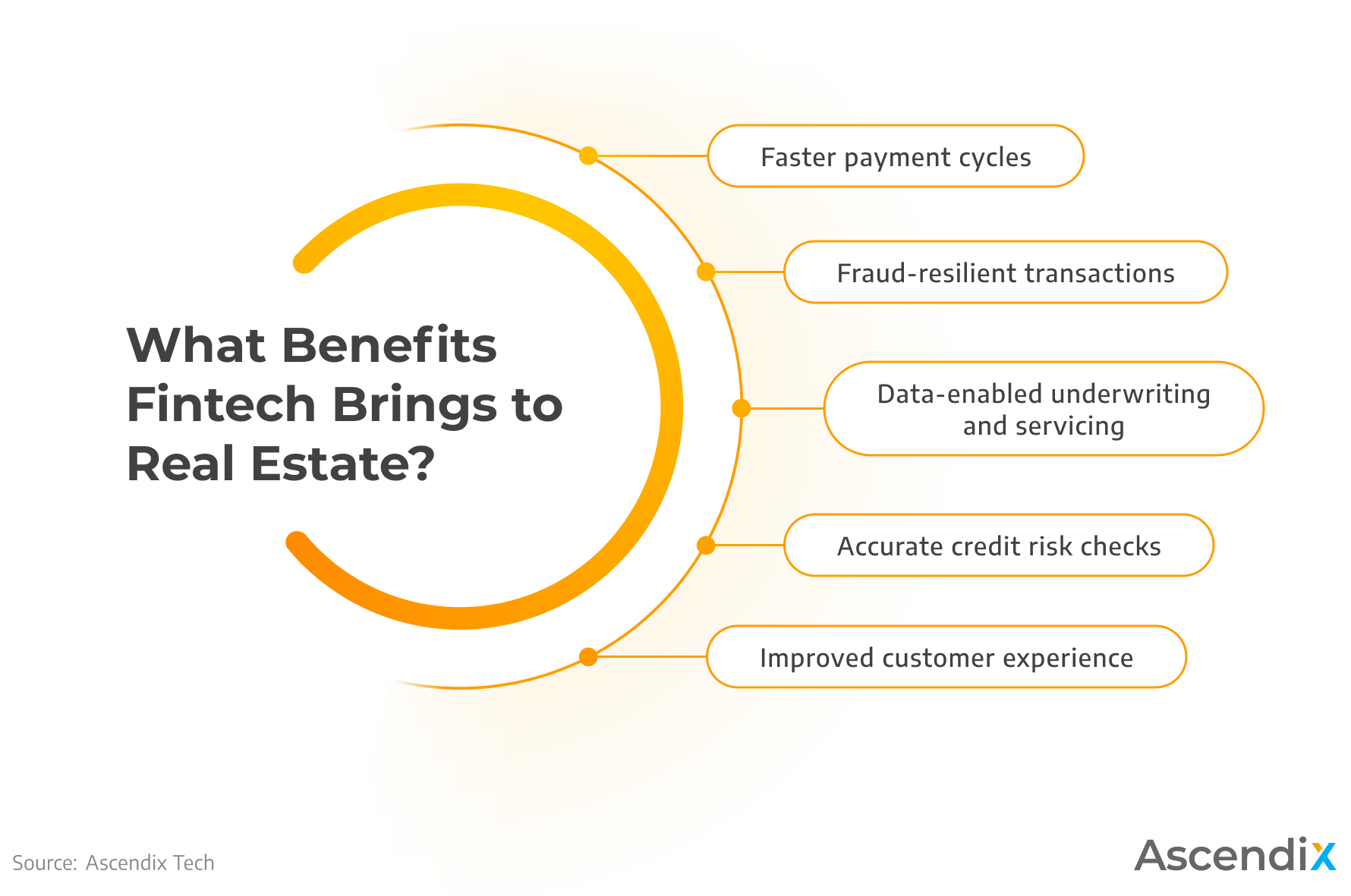Looking for Help with Building a Proptech Solution?
We’ve got 2 decades of expertise in real estate and SaaS development. Trust your project to Ascendix professionals.
Fintech and proptech may seem to have equally revolutionized financial and real estate services over the past decade. But this is barely true.
While the former has undergone a significant behavioral shift toward seamless user experience and lean operational structures, the latter is still dominated by slow processes and dated systems. This means, however, that real estate fintech is an untapped area of technological innovation. And those who catch up with it first will take the market lead for years to come.
Two fancy terms coined no later than a decade ago, both proptech and fintech have their roots in “technology.” The former stands for “property technology” and refers to all disruptive real estate startups and their technological solutions aimed at redefining how the property is sold, managed, and invested in, whereas the latter describes how new technology is used to improve and automate the delivery and use of financial services.
At its most basic, proptech includes three technological movements that are increasingly intertwined:
Fintech, on the other hand, is often associated with money transfer apps such as Venmo and PayPal, crowdfunding solutions such as GoFundMe, and peer-to-peer lending such as Funding Circle.
Both triggered by acute issues such as the lack of transparency into processes, poor data management, and slow decision-making in finance and real estate, fintech and proptech have naturally entered into a significant crossover referred to as real estate fintech, facilitating the transactions of real estate assets.

Real Estate Fintech Defined | Ascendix Tech
Real estate transactions can be divided into three large buckets: 1) renting / buying / selling, 2) lending and 3) investing. Each of these candidly massive chunks of real estate has been suffering from inefficient, opaque systems and processes, making a physical space a frustratingly illiquid asset in terms of speed of sale, probability of sale, and costs associated with that sale.
But not anymore. Or rather not with pioneering proptech and fintech companies gradually testing the waters of the change-resilient real estate industry and slowly but surely injecting innovation ideas throughout the whole transaction cycle.
Considering the recent movements in residential and CRE technology, the most probable fintech and proptech map looks as follows:

Innovation Opportunities for Fintech in Real Estate | Fintech and Proptech
Three major milestones of our life, leasing / selling / buying involves much research and back and forth communication, eventually creating loads of data that one person wouldn’t be able to get a grip of. On the other side of the coin, these opaque processes create a lot of low-hanging opportunities for the below-listed proptech and fintech companies and their solutions.
For a renter, looking for a property can turn into an endless nightmare unless you bring all property information along with photos, price, and neighborhood descriptions in one, preferably, online place.
Partnering with agents and owners, online real estate marketplaces transformed the consumer real estate research experience by creating a standardized place for various firms to display their sale or lease listings and for renters and buyers to search for the desired property. There are two types of such solutions:
At the core of these fintech and proptech websites usually lie enhanced data aggregation that captures clients’ data provided through chatbots, forms, and face-to-face communication, and Artificial Intelligence that analyses clients’ digital behavior and comes up with smart suggestions that cater to their needs and preferences.
For the prospective homebuyer and seller wanting to upsize or downsize, looking for properties is just as troublesome. The concerns are doubled due to the tremendous uncertainty throughout the valuation process: sellers, when they take an offer, are often hesitant about whether they have asked for the best price, whereas buyers always want to make sure they’re not paying too much.
The fog around the sensitive price question is easily cleared by iBuyers, or “instant buyers” – fintech proptech companies that use algorithms and technology to buy and resell homes quickly.
By leveraging big data and AI to fuel automated valuation models (AVMs) which take hundreds of different factors into account, iBuyers like Opendoor and Offerpad can make a quick and well-informed offer on a house in a matter of seconds.
Incorporating LegalTech, such as smart contracts, these outlets eliminate middlemen from the arduous transaction chain, thus dramatically reducing fees for buyers and sellers alike. Considering the tremendous potential of AVM in the home valuation process, the fintech and proptech model of iBuyers can be just as helpful for appraisers as they are for home buyers and sellers.
Key features of iBuyers
Brokers are the luckiest stakeholders in the marriage of fintech and proptech, as they can leverage both the above-mentioned solutions (marketspaces for listing marketing and iBuyers for property valuation) and numerous other brokerage enablement tools like CRM systems (AscendixRE, Salesforce, Dynamics 365), marketing collateral generation tools (Composer, Buildout), and secure deal and collaboration rooms (MarketSpace).
However, with the recent real estate fintech shift toward platformization (source), it makes sense to have all these solutions interconnected in one ecosystem rather than leveraging them one by one. This is what Ascendix has done for 26 years and is still doing today.
We have partnered with the big names in the real estate industry like JLL and Colliers and developed custom solutions for their brokerages on top of our core products AscendixRE and Marketspace, as well as Dynamics 365.
If a marketing tool like Marketspace is connected to a Customer Relationship Management system, it can benefit from form fill technology and e-Signature capabilities to prepopulate forms and documents with the data already existing in the form thus dramatically improving broker efficiency.
We’ve got 2 decades of expertise in real estate and SaaS development. Trust your project to Ascendix professionals.
In proptech and fintech, lending services revolve around mortgages – loans issued by banks or other financial institutions to help a borrower purchase a property. Traditionally, there are at least 3 distinct steps in the mortgage loan process, each taking weeks:
Overall, from when the lender receives a mortgage application to the time the loan is disbursed may well pass 52 days, according to Ellie Mae.
However, with the infinite potential of fintech in real estate, a traditional outdated procedure where people still have to fill in hard copy forms and are being asked to provide physical copies of their bank statements can be easily flipped to a completely digital experience where lenders can check your information digitally and approve you for a home loan in less than an hour:

The Digital Mortgage Journey Empowered by Real Estate Fintech
This becomes possible with the following real estate fintech solutions:
Credit risk real estate fintech platforms aim to automate the very first step in the loan origination process – credit reporting. These solutions usually partner with credit reporting bureaus like TransUnion or Equifax to help lenders gain a complete understanding of their client’s credit background before moving forward with negotiations.
To come up with precise analytics, credit risk fintech real estate apps leverage custom credit scoring formulas, risk alert features, and in-depth and predictive analytics programming.
A good illustration of how credit reporting data may be supplied to lenders is Hazu – a quick data provisioning solution that integrates with the lender’s on-site system through a custom-built end interface in order to allow every type of user to easily access, subset, and export the exact data they needed.
It is also imperative that such credit real estate fintech platforms have robust visualization capabilities like those we built in the custom Salesforce CRM for Source Energy Partners.
Key features of Credit Reporting Platforms:
Developed either for quick loans for retail customers, through mortgage origination processes, or complex business loans for SMEs or corporations, these comprehensive fintech real estate tools will run all stages of the lending process, starting from data collection all the way to deal closing – automating all the steps in between.
The main benefit of such proptech and fintech platforms is not just collecting applications but automating processes that are normally done by office staff. For example, loan origination tools like a US-based startup Cloudvirga can perform complex calculations at the point of sale to create underwriter-ready loans, while others like Lender Price provide real-time analytics to manage pricing for conforming, non-conforming, qualified and non-qualified mortgages, portfolio, and specialty loans. Thereby these real estate fintech platforms significantly reduce the time to close loans and provide a better customer experience.
Considering the emerging proptech trends around SaaS and data accessibility, it is also vital that the loan origination system is connected to the cloud and integrated with other disparate systems existing within the organization, thus allowing lenders, appraisers, and underwriters to collaboratively work on a loan and access needed data from anywhere anytime.
This is what Ascendix did for a few lending companies on our portfolio who used to struggle with chaotic systems and databases not having a single view of the customer, right until we designed and implemented custom loan origination platforms for them, leveraging cutting-edge cloud and analytics technologies.
Key points of Loan Origination Systems:
Unlike loan generation systems automating all steps in the loan processing cycle, these fintech real estate platforms focus exclusively on underwriting. They utilize machine learning and AI, as well as business rules manually defined by the underwriter, to analyze a client’s financials (such as credit score and income) in addition to the overall value of the property they are looking to purchase (usually determined by an appraiser). From there, the system decides whether to approve a loan application or refer it to a manual underwriter.
Key points of Automated Underwriting Systems:
The third multi-trillion-dollar bucket of real estate, investing is a complex, multi-step process often obscured by the legacy systems’ inefficiencies. Here are several real estate innovation ideas for those considering addressing these imperfections with the marriage of proptech and fintech.
Real estate fintech crowdfunding is a relatively new way to invest in commercial or residential real estate which gave rise to real estate crowdfunding platforms (aka crowdfunding websites like CrowdStreet and DiversyFund).
The whole beauty about these online real estate fintechs is that they expose everyday investors to assets traditionally reserved for the wealthy by pairing individual investors with developers. This still requires investing capital, although less than what’s required to purchase real estate outright and without the hassles of owning, financing, and managing properties.
Since online fintech real estate crowdfunding platforms are mainly aimed at the individual investor, they should have a user-friendly interface, easy navigation, investment tracking, ID verification, Know-Your-Customer modules, as well as machine-learning-powered chatbots and mobile applications. It is also important to implement document management, reporting, and e-Signature modules, like Composer, one of the main real estate solutions in the Ascendix product family.
Learn more about how you can leverage Ascendix’s custom development experience here.
Main features of Crowdfunding Platforms:
See how AscendixTech can help you close more deals and improve your prospecting.
Another untapped area for the proptech fintech innovation is real estate capital market management. For capital markets firms sourcing investment opportunities and matching those with suitable investors involves multiple chains of communication, both past and present, and loads of data usually unequally spread within the organization’s systems.
To manage such an intricate infrastructure, capital market firms need a core system that would unite all workflows and disparate processes under one hood. And aspiring fintech real estate companies are well positioned to do this by incorporating an all-in-1 Customer Relationship System specifically tailored to the real estate investing transactions.
Here are examples of features we implemented in our AscendixRE CRM for Capital Markets and derivative custom solutions for our clients:
Depending on the capital markets firm nature, additional modules for advanced search (Ascendix Search), document management, or team collaboration may be required.
Although proptech and fintech have both been the hot topics on the business agenda for the last decade, it would be fair to say that proptech disruption was much inspired by the advancement in the financial services industry, which was once prone to slow, manual workstreams and grounded by physical infrastructure, just as real estate still is today.
This tremendous gap in advancement between proptech and fintech is clearly reflected in the venture capital funding: in the year 2015 when real estate tech was just starting, proptech companies received only $2.21 billion of funding while investments in financial technology totaled $46.7 billion.
And although investments in proptech companies hit $32 billion last year, real estate remains one of the most technologically underserved industries, largely because of highly fragmented infrastructure, frequent compliance checks, and vast stakeholder ecosystem.
At the same time, it is one of the most transaction-heavy asset classes. In 2021 alone, $3.6 trillion was exchanged in the US from the acquisition and sale of real estate.
The undertechnologized nature of real estate coupled with tremendous transaction volume creates vast opportunities for real estate fintech companies to address significant, unsolved pain points devouring transactional efficiency in real estate for decades. Specifically, the application of fintech in real estate means:

Benefits of Fintech in Real Estate | Ascendix Tech
Check out the overview of the proptech consulting and software development projects we delivered to our clients.
Although there are clear signs of positive disruptions in real estate transactions, many pain points remain unsolved. Buyers and sellers still struggle to navigate the fragmented landscape of physical space, relying on offline and insecure payment systems, while banks, appraisers, investors, and brokers are torn between merciless workstreams.
As I have already pointed out earlier, these inefficiencies actually play into the hands of fintech real estate innovators wanting to inject new lean operational structures and new value propositions into how real estate transactions are managed. Without real estate expertise not technical background, however, this would be barely possible.
Having operated in the real estate business for 16 years as a software developer and technology consultant, Ascendix took time to get smart about the pain points in the traditional transaction management and the ways to tackle them with cutting-edge proptech and fintech solutions. If you don’t have internal resources or real estate knowledge but have a revolutionary proptech fintech idea in mind, it is worth considering partnering with us because:
Tell us more about your project and we’ll make sure to provide you with the knowledge and resources to make innovation happen for you and your business.
Alina is a proptech technology expert and a storyteller at Ascendix, investigating the real estate market and sharing her insights and tips with up-and-coming proptech startups, established real estate agencies, and industry stakeholders. She talks about real estate technology, business automation, and industry news.